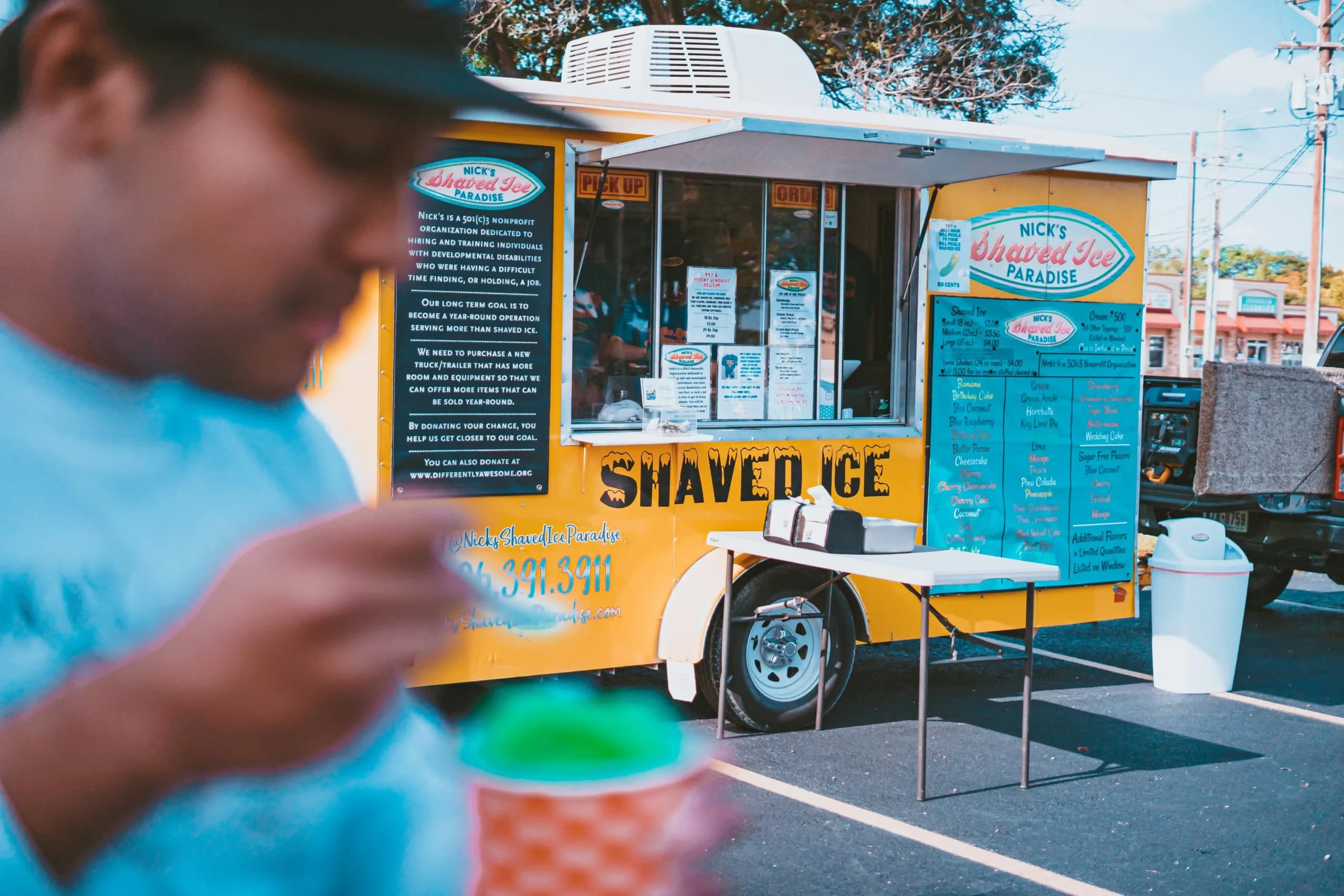If you play your cards right, starting a food truck business in Iowa can be a highly rewarding venture. Often referred to as the “Food Capital of the World,” Iowa is home to one of the nation’s strongest agricultural sectors. This deep foundation in food production lends to a thriving food culture and a steady demand for unique dining experiences, making it an ideal place to launch and grow a food truck business.
However, you can’t hit the road without acquiring all necessary business permits and licenses first. Completing these requirements assures state authorities that your food business can meet the state’s standards for health, safety, and financial fairness.
Food truck classifications
Before obtaining any type of food truck license, you need to identify the mobile food unit classification your food truck falls under. Licensing requirements and rules on food truck equipment will differ depending on the type of food truck you operate.
Class II Non-Refrigerated Vending Units
A non-refrigerated vending unit may only serve intact, non-potentially hazardous commercially prepackaged food and drinks. Because this type of unit lacks proper food preservation equipment, on-site preparation of food and drinks is not allowed. These units can operate without a mobile food establishment license, but may need an additional warehouse license depending on the county of operation.
Class II Refrigerated or Hot Vending Units
Refrigerated or hot vending units may serve potentially and non-potentially hazardous commercially prepackaged foods. While the permit holder or their employees are prohibited from preparing, assembling, cooking, or opening packages of food or beverage on the unit, they may prepare food commercially or in the permit holder’s licensed restaurant or commissary.
Class III
Class III units can serve potentially and non-potentially hazardous packaged foods and unpackaged foods with limited assembly. The permit holder is prohibited from preparing, assembling, or cooking raw animal foods on-site, but is allowed to reheat commercial or commissary prepared foods. Customers cannot partake in self-service of unpackaged foods.
Class IV
Class IV units may serve potentially and non-potentially hazardous foods. On-site preparation, cooking, cooling, reheating, and assembly of pre-cooked and/or raw products is permitted. Permit holders may have an unlimited menu, but processes are subject to review at pre-operational inspection.
Licenses and permits you need to operate a food truck in Iowa
Compared to other states, Iowa requires fewer licenses to operate a food truck. You only need to register your business, a sales tax permit, a mobile food establishment license for your truck, and a certified food protection management certification for at least one of your employees.
1. Business registration
Iowa law doesn’t require general business licenses to operate. All you need to do is register your business with the appropriate authority, depending on your business entity type. Sole proprietors register with their local county recorder’s office, while LLCs, corporations, and partnerships register with the Iowa Secretary of State.
2. Sales and use tax permit
All Iowa retail businesses, including food trucks, need to have an Iowa sales and use tax permit. This ensures that your business will collect and remit the appropriate amount of state sales tax on its products.
You can apply for a sales and use tax permit through the Streamlined Sales Tax Registration System (SSTRS) if you intend to operate within one of the twenty states participating in the Streamlined Sales and Use Tax Agreement.
However, if you only intend to operate within Iowa, you should register through the Iowa Department of Revenue’s online portal.
3. Mobile food establishment license
All food truck owners must obtain a mobile food establishment license from the Iowa Department of Inspections, Appeals, and Licensing Food Safety Bureau. This license costs $250 per year.
You will need to apply for your license at least 30 days before operating. Upon application, county officials will ask you to complete the following steps.
- Submit a detailed floor plan, menu, and list of equipment.
- Ensure at least one staff member holds a food protection manager certification.
- Pass a pre-opening inspection.
If you’re converting an existing structure for food use or making renovations that impact food preparation or operations, you must also pass a plan review.
You should also make sure that your food truck meets Iowa’s mobile food unit requirements. Requirements differ depending on the class of food truck.
- The unit must be mobile. For example, tents and tables used for temporary food establishments don’t count as mobile units.
- Class III and IV mobile units or push carts must have hand washing sinks that can provide water at a temperature of 100°F, delivered through a mixing valve or combination faucet. A ready stock of hand washing soap and disposable towels (or other approved means of hand drying) must be available.
- Additional coolers (igloos) that are unattached to the unit may not store items other than bottled drinks and ice.
- Cleaning supplies and soiled utensils must be stored in additional tubs or containers that are non-absorbent, covered, and positioned to prevent contamination or pest infestation.
- Any tables assembled next to the unit must be used exclusively to serve condiments, napkins, and straws. This table must be smooth, easily cleanable, and visible from inside the mobile unit.
- Mobile units must be set up to prevent public access to food preparation and cooking areas.
- Vehicles that were not designed for food preparation, such as automobiles, trucks, or vans, cannot be used as mobile food establishment units. You may not store food products in prohibited vehicles.
- Class IV Mobile Food Units are permitted to cook on a covered grill or smoker located outside the unit. All other outdoor cooking or food preparation is prohibited.
4. Food protection manager certification
As mentioned above, at least one person on your staff needs to be a certified food protection manager (CFPM). This ensures that your establishment has the knowledge and capacity to practice food safety, preventing food-borne illnesses and other food-related risks.
You can obtain a CFPM credential by passing an exam from an organization with American National Standards Institute National Accreditation Board (ANSINAB) accreditation. Check out ANSINAB website for a list of organizations.
The cost of a CFPM certification ranges from $25 to $130, depending on the organization. Some organizations only offer the exam without a course or program and therefore charge lower fees. However, other organizations might also provide online courses, textbooks, or other training materials, which add to the total cost.
Renewing food truck licenses in Iowa
Iowa regularly checks whether businesses remain qualified to sell food safely. To continue operating your food truck legally, you need to keep track of license renewal schedules. We’ve provided a handy guide below.
| Permit or requirement | Who issues it | Renewal timeline | Notes |
| Business registration | Iowa Secretary of State | Every two years | Costs $30; Only required for LLCs, corporations, and partnerships. |
| Sales and use tax permit | Streamlined Sales Tax Governing Board or Iowa Department of Revenue | No renewal | N/A |
| Mobile food establishment license | Iowa Department of Inspections, Appeals, and Licensing Food Safety Bureau | Annually | Costs $150; requires at least one staff member to have CPFM. |
| CPFM | Any ANSINAB-accredited CPFM exam provider | Every five years | Required for at least one person in charge of your food truck. |
Cruise to success with 7shifts
Effective preparation leads to a smooth and steady food truck journey. By staying informed, you can proactively navigate your state’s legal business requirements, saving yourself time, stress, and money while keeping your business and its good name clean.
As you take your food truck to the road, it helps to have the right tools and systems. 7shifts, a leading workforce management platform, ensures efficiency in food truck workflows by providing automated solutions for scheduling, communication, team engagement, and more. These tools spare you from the tedium of manual tasks, empowering you to focus on running your business.

Rebecca Hebert, Sales Development Representative
Rebecca Hebert
Sales Development Representative
Rebecca Hebert is a former restaurant industry professional with nearly 20 years of hands-on experience leading teams in fast-paced hospitality environments. Rebecca brings that firsthand knowledge to the tech side of the industry, helping restaurants streamline their operations with purpose-built workforce management solutions. As an active contributor to expansion efforts, she’s passionate about empowering restaurateurs with tools that genuinely support their day-to-day operations.
